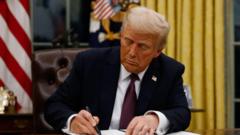A federal judge has temporarily halted President Trump's controversial freeze on federal grants and loans, leading to a tense anticipation surrounding government funding.
Federal Judge Blocks Trump's Freeze on Major Federal Grants and Loans

Federal Judge Blocks Trump's Freeze on Major Federal Grants and Loans
US judge intervenes to pause President Trump's funding freeze aimed at diversity and inclusion programs.
In a significant development, US Judge Loren AliKhan issued a temporary stay against President Donald Trump's order to freeze hundreds of billions of dollars in federal financial assistance just as it was about to take effect on Tuesday. The decision came just minutes before the planned implementation of the freeze, which was aimed at redirecting funds towards Trump's administration priorities, particularly concerning diversity and inclusion initiatives deemed as "wokeness" by the White House.
The legal action was initiated by various organizations representing grant recipients, who argued that the freeze on already approved funding contravenes existing laws. Judge AliKhan's ruling keeps the funding in place until a scheduled oral argument next Monday at 17:00 EST (22:00 GMT). The White House’s Office of Management and Budget had directed agencies to cease all activities related to federal financial assistance, creating widespread confusion and concern among entities reliant on such support.
During her first press briefing, White House Press Secretary Karoline Leavitt clarified that the freeze was intended to ensure responsible management of taxpayer dollars, allowing a thorough evaluation of programs scrutinized for their emphasis on "woke" gender issues. Nevertheless, this rationale has sparked backlash from opposition representatives, with many emphasizing that the halt in funding would negatively impact vital programs and services, including non-profit organizations and research institutions.
Diane Yentel, president of the National Council of Nonprofits and a plaintiff in the case, expressed elation at the ruling, asserting that the court's decision was a victory for all involved in the ongoing struggle for federal funding. According to her organization, Trump's directive aimed to effectively eliminate nearly all federal grant programs, a move that was characterized as lacking a legal foundation or rational basis.
Meanwhile, Deputy Chief of Staff Stephen Miller defended the funding freeze, arguing it was a necessary step to gain proper control over governmental expenditure. He sought to reassure Americans that well-established federal programs, such as Medicaid, Social Security, and the Supplemental Nutrition Assistance Program, were not going to be affected.
Top Democratic leaders expressed grave concern about the potential fallout from Trump's order, underscoring the "breathtaking" scope of the freeze and its possible devastating effects on communities nationwide. Senate Minority Leader Chuck Schumer warned that the move could lead to widespread chaos, missed payrolls, and overdue rent payments, calling for immediate action to address the alarming situation.
As the legal battle unfolds, attention remains fixed on the implications of this ruling, with many hoping for a resolution that will secure vital funding for a multitude of American programs before the situation escalates further.
The legal action was initiated by various organizations representing grant recipients, who argued that the freeze on already approved funding contravenes existing laws. Judge AliKhan's ruling keeps the funding in place until a scheduled oral argument next Monday at 17:00 EST (22:00 GMT). The White House’s Office of Management and Budget had directed agencies to cease all activities related to federal financial assistance, creating widespread confusion and concern among entities reliant on such support.
During her first press briefing, White House Press Secretary Karoline Leavitt clarified that the freeze was intended to ensure responsible management of taxpayer dollars, allowing a thorough evaluation of programs scrutinized for their emphasis on "woke" gender issues. Nevertheless, this rationale has sparked backlash from opposition representatives, with many emphasizing that the halt in funding would negatively impact vital programs and services, including non-profit organizations and research institutions.
Diane Yentel, president of the National Council of Nonprofits and a plaintiff in the case, expressed elation at the ruling, asserting that the court's decision was a victory for all involved in the ongoing struggle for federal funding. According to her organization, Trump's directive aimed to effectively eliminate nearly all federal grant programs, a move that was characterized as lacking a legal foundation or rational basis.
Meanwhile, Deputy Chief of Staff Stephen Miller defended the funding freeze, arguing it was a necessary step to gain proper control over governmental expenditure. He sought to reassure Americans that well-established federal programs, such as Medicaid, Social Security, and the Supplemental Nutrition Assistance Program, were not going to be affected.
Top Democratic leaders expressed grave concern about the potential fallout from Trump's order, underscoring the "breathtaking" scope of the freeze and its possible devastating effects on communities nationwide. Senate Minority Leader Chuck Schumer warned that the move could lead to widespread chaos, missed payrolls, and overdue rent payments, calling for immediate action to address the alarming situation.
As the legal battle unfolds, attention remains fixed on the implications of this ruling, with many hoping for a resolution that will secure vital funding for a multitude of American programs before the situation escalates further.






















